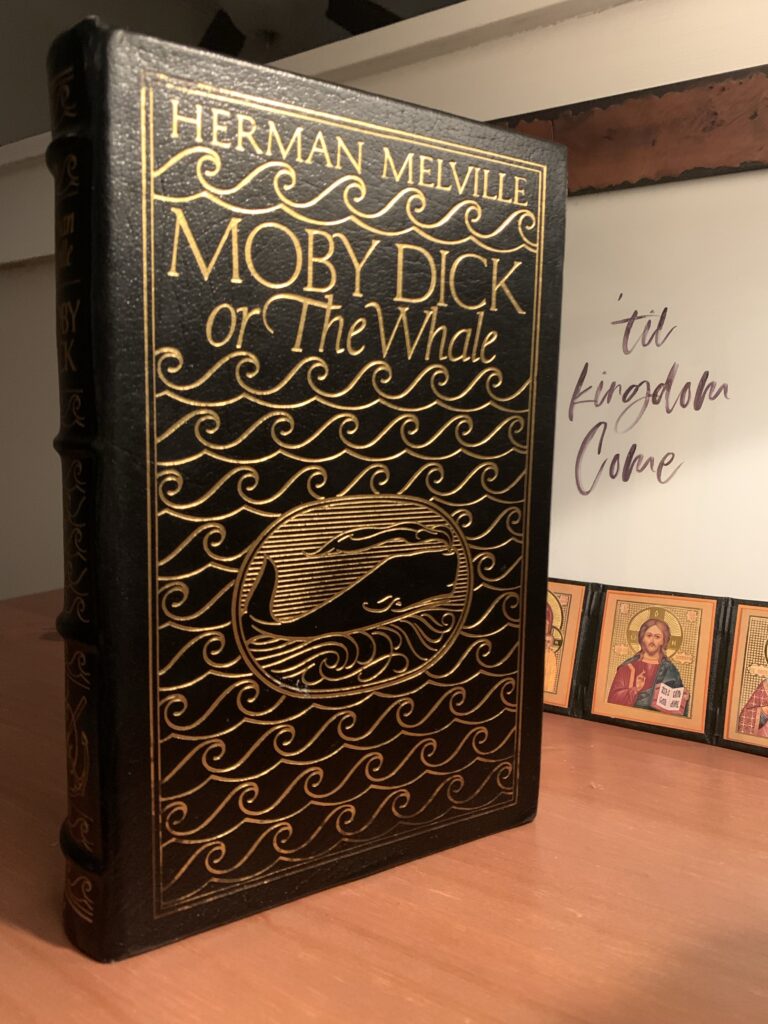Moby Dick, or The Whale, is considered one of the greatest books in American culture. Until recently, I had no clue what it was really about beyond occasional references of Ahab hunting the White Whale. To be honest, I thought it was a children’s story. Far from a cute novel for kids, this book is a massive collection of reflections told with a worldview full of religiosity.
Reading the first two pages of this properly titled “whale” of a book, I was struck by references of “a dreamy Sabbath afternoon” and an artist painting “trees, each with a hollow trunk as if a hermit and a crucifix were within”. The whaling journey hadn’t even left shore, and the narration was full of religious references, terminology, and even theology! To my surprise, the narrator used these references plainly as if they were common speech for him.
Forming a Worldview: Cult Cultivates Culture
Herman Melville and his main character, Ishmael, were clearly well versed in Christianity and the Bible. It is also clear that this character’s religious experience was more than just subject knowledge. Ishmael had a religious worldview that was like a lens he used to look at the world around him.
How was Ishmael’s worldview formed?
You may have heard the phrase, “You are the sum of the 5 people that you spend the most time with.” While those closest to us will definitely have more impact, we can expand on this idea to see that you are impacted by all of your surroundings, the culture at large. But what makes the culture? This works both ways.
Cult – from Latin cultus or “to worship” – is what we center our lives around. It is what we hold dear and put above all else in our lives. Coincidentally, what we worship cultivates our minds to grow our culture – the exterior expressions of our worship.
Worldview is formed by what we worship. Cult cultivates culture.
Ishmael’s Worldview
Now back to Ishmael. Living in mid-1800s New England, this man was sandwiched between the “Second Great Awakening” and a third.
The New England culture at this time was full of passionate Protestant preaching that would draw crowds to public places. The Bible was popular, but ideas and understanding of their meaning were widely varied. Church membership was up, but so was the number of Churches claiming different theology.
Understanding the culture where our narrator was coming from, we can see the outside influences that affect his worldview.
Ishmael Falls into Relativism
Ishmael provides countless reflections on faith, philosophy, science, and the world around him. Some are good, others great, but first let’s look at an area where Ismael’s worldview doesn’t quite align with reality, but instead is formed by culture at large.
“But what is worship? – to do the will of God? that is worship. And what is the will of God? – to do to my fellow man what I would have my fellow man do to me – that is the will of God. Now, Queequeg is my fellow man. And what do I wish that this Queequeg would do to me? Why, unite with my in my particular Presbyterian form of worship. Consequently, I must then unite with him in his; ergo, I must turn idolator.”
Moby Dick – Chapter 10 – “A Bosom Friend”
To summarize, Ishmael’s bunk mate, Queequeg, is a native man from a Pagan tribe. Ishmael uses his worldview to justify worshiping an idol alongside his new companion.
The thought process:
- Worship is “to do God’s will”
- God wants me to treat others the way I want to be treated
- I want others to worship the way I do
- Therefore, I should worship how others do.
It goes full circle!
While this is likely a comment by Melville on an aspect of religion that he found silly, we can also look at this through our own worldview and see that it really is silly because it is self-contradicting. To use one’s religion to justify going against the same religion is funny, but nonsensical.
In seriousness, Ishmael participated in idol worship with Queequeg in an effort to not rock the boat. He was uncomfortable, and justified the action quickly because he did not want to bother anyone. This is called relativism.
There is pressure at times to be relativistic in the name of “tolerance”. But relativism says “I agree with you, no matter what” while tolerance says “I disagree with your idea, but I respect you, the person”. Disagreement does not equal disrespect just like tolerance does not necessarily mean agreement.
This pressure to believe that nothing is wrong is also self-contradicting. It comes from the culture at large influencing our worldview, like our lens being fogged. It can be easy to fall into relativism if we aren’t actively forming our own worldview. We can keep our lenses clear by focusing on what is True, Good, and Beautiful in this world.
Beauty of Christian Worldview
While Ishmael’s practice and beliefs are flawed at times, there is still benefit to having a worldview that is familiar with scripture and traditions of the faith. It is better that Ishmael is reflecting on God in his life at all than to be indifferent or apathetic.
Ishmael’s religious worldview allows him to contemplate Godly things even while sailing in remote parts of the ocean. He spends a whole chapter reflecting about Jonah and the whale. In passing, he compares the ship mast to the pillars of Saint Stylites, ponders the writings of St. Paul in Corinthians 15, and considers the beauty St. Peter’s as well as other Cathedrals.
Recognizing spiritual reality beyond the surface gives a greater meaning and depth to this life. We live more fully knowing that there is more life after death.
Seeing Heaven and Earth
Here is a sample of one reflection that I enjoyed in a chapter dedicated to reflecting on the the whale spout:
“And how nobly it raises our conceit of the mighty, misty monster, to behold him solemnly sailing through a calm tropical sea; his vast, mild head overhung by a canopy of vapor, engendered by his incommunicable contemplations, and that vapor – as you will sometimes see it – glorified by a rainbow, as if Heaven itself had put its seal upon his thoughts. For d’ye see, rainbows do not visit the clear air; they only irradiate vapor. And so, through all the thick mists of the dim doubts in my mind, divine intuitions now and then shoot, enkindling my fog with a heavenly ray. And for this I thank God; for all have doubts; many deny; but doubts or denials, few along with them, have intuitions. Doubts of all things earthly, and intuitions of some things heavenly; this combination makes neither believer nor infidel, but makes a man who regards them both with equal eye.”
Moby Dick – Chapter 85 – The Fountain
Compare this to the Catechism of the Catholic Church which says:
“To be sure, revealed truths can seem obscure to human reason and experience, but “the certainty that the divine light gives is greater than that which the light of natural reason gives.” [St. Thomas Aquinas, STh II-II 171, 5, obj. 3.] “Ten thousand difficulties do not make one doubt.” [John Henry Cardinal Newman, Apologia pro vita sua (London Longman, 1878) 239.]
CCC 157
I think Ishmael’s use of the word doubt is actually closer to what Cardinal Newman calls “difficulty”. It is a difficulty to strive to reason all things. This is where the light of faith comes through the mist and illuminates it. It is beautiful that he pauses here to thank God for the gift of this light of faith.
“I am the light of the world. Whoever follows me will not walk in darkness, but will have the light of life.” – John 8:12
Nurturing our Worldview
Experiencing this divine light is hard to put into words, but it is profound and real. Moments like this are probably more common for the men who nourish their mind with the Word of God, and then provide times of silence in order to receive the fruit of contemplation.
While you may not have a chance to experience a whale spout up close or stand atop a mast on a starry night, here are some ways you might be able to nurture this light.
To start, Scripture, Tradition, and the teachings of the Church plant the seeds and nurture our conscience and our intellect. Lately, I have been diving into these podcasts to help me get through the parts of Scripture that have always been difficult me.
Now, for the silence.
- Find a church with adoration times
- Find any other beautiful church or chapel
- Go for a hike in nature
- Go to a river or the beach and watch the water
- Make a fire and watch it
- Watch a Sunrise/Sunset
- Get up 15 minutes earlier to pause in the morning
To give an idea of what I think of, these are some of my favorite scenes where I have experienced gratitude for God, and the light of faith.
Let’s continue to form our world view in order to produce good fruit into the world!
The copy of Moby Dick pictured is the Easton Press, 100 Greatest Books Ever Written Edition. To see more from my book collection with reflections, click here.










One thought on “Worldview and The Whale: Religiosity in Reading Moby Dick”
Comments are closed.